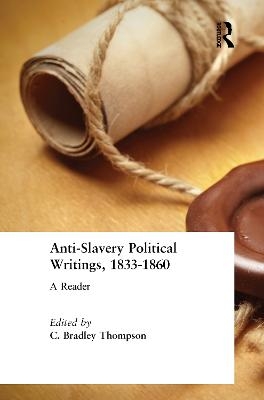
Anti-Slavery Political Writings, 1833-1860
Routledge (Verlag)
978-0-7656-0402-6 (ISBN)
C. Bradley Thompsom
Part 1 Slavery and Freedom; Chapter 1 The Patriarchal Institution, as Described by Members of Its Own Family (1860), Lydia Maria Child; Chapter 2 “Lecture on Slavery, No. 1” (1850), Frederick Douglass; Chapter 3 Selections from Slavery (1836), William E. Channing; Part 2 Immediate Emancipation; Chapter 4 “Declaration of Sentiments of the National Anti-Slavery Convention” (1833), William Lloyd Garrison; Chapter 5 Selections from Lectures on Slavery and its Remedy (1834), Amos A. Phelps; Part 3 Moral Suasion and Politics; Chapter 6 “An Address to the Abolitionists of Massachusetts, on the Subject of Political Action” (1838); Chapter 7 “A Letter on the Political Obligation of Abolitionists, with a Reply by William Lloyd Garrison” (1839), James G. Birney; Chapter 8 “Talk About Political Party” (1842), Lydia Maria Child; Part 4 The Liberty Party; Chapter 9 “Lecture Showing the Necessity for a Liberty Party, and Setting Forth Its Principles, Measures, and Object” (1844), Arnold Buffum; Chapter 10 “Address of the Macedon Convention” (1847), William Goodell; Part 5 Slavery and the Constitution; Chapter 11 Slavery and the Constitution (1849), William I. Bowditch; Chapter 12 “The Constitution of the United States: Is It Pro-Slavery or Anti-Slavery?” (1860), Frederick Douglass; Part 6 Free-Soil and Fugitive Slaves; Chapter 13 “The Two Altars; Or, Two Pictures in One” (1851), Harriet Beecher Stowe; Chapter 14 “Speech on Our Present Anti-Slavery Duties” (1850), Charles Sumner; Part 7 Impending Crisis; Chapter 15 “Moral Responsibility of Statesmen” (1854), Joshua R. Giddings; Chapter 16 “What Is My Duty as an Anti-Slavery Voter?” and “Fremont and Dayton” (1856), Frederick Douglass; Chapter 17 “House Divided”: Speech at Springfield, Illinois (1858), Abraham Lincoln; Part 8; Chapter 18 “Address to the Slaves of the United States of America” (1843), Henry Highland Garnet; Chapter 19 “No Compromise With Slavery” (1854), William Lloyd Garrison; Chapter 20 “No Rights, No Duties: Or, Slaveholders, as Such, Have No Rights; Slaves, as Such, Owe No Duties” (1860), Henry C. Wright; Chapter 21 A Plan for the Abolition of Slavery (1858), Lysander Spooner;
| Erscheint lt. Verlag | 30.9.2003 |
|---|---|
| Verlagsort | London |
| Sprache | englisch |
| Maße | 156 x 234 mm |
| Gewicht | 750 g |
| Themenwelt | Literatur ► Essays / Feuilleton |
| Geschichte ► Allgemeine Geschichte ► Neuzeit (bis 1918) | |
| Geisteswissenschaften ► Geschichte ► Regional- / Ländergeschichte | |
| ISBN-10 | 0-7656-0402-7 / 0765604027 |
| ISBN-13 | 978-0-7656-0402-6 / 9780765604026 |
| Zustand | Neuware |
| Haben Sie eine Frage zum Produkt? |
aus dem Bereich


